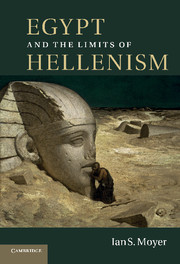Book contents
- Frontmatter
- Contents
- List of figures and table
- Acknowledgments
- Introduction: the absence of Egypt
- 1 Herodotus and an Egyptian mirage
- 2 Luculentissima fragmenta
- 3 The Delian Sarapis aretalogy and the politics of syncretism
- 4 Thessalos and the magic of empire
- Epilogue
- Appendix I Text and translation of the Delian Sarapis aretalogy (IG XI. 1299)
- Appendix II Translation of the Madrid manuscript of Thessalos, De virtutibus herbarum (Codex Matritensis Bibl. Nat. 4631)
- Appendix III Dating the composition of Thessalos, De virtutibus herbarum
- Bibliography
- Index
Introduction: the absence of Egypt
Published online by Cambridge University Press: 05 July 2011
- Frontmatter
- Contents
- List of figures and table
- Acknowledgments
- Introduction: the absence of Egypt
- 1 Herodotus and an Egyptian mirage
- 2 Luculentissima fragmenta
- 3 The Delian Sarapis aretalogy and the politics of syncretism
- 4 Thessalos and the magic of empire
- Epilogue
- Appendix I Text and translation of the Delian Sarapis aretalogy (IG XI. 1299)
- Appendix II Translation of the Madrid manuscript of Thessalos, De virtutibus herbarum (Codex Matritensis Bibl. Nat. 4631)
- Appendix III Dating the composition of Thessalos, De virtutibus herbarum
- Bibliography
- Index
Summary
Dialectic-history: the past is more than just one other country.
Marshall Sahlins, Apologies to ThucydidesIn his classic study, Alien Wisdom: The Limits of Hellenization, Arnaldo Momigliano explored what he called “an intellectual event of the first order, the confrontation of the Greeks with four other civilizations” in the Hellenistic period: Romans, Celts, Jews, and Iranians. Remarkable for its absence from his account is the ancient civilization of the Egyptians, which had long fascinated the Greeks, and, after the conquests of Alexander, confronted them more directly than ever before. Momigliano's argument for excluding Egypt from his lectures was twofold. First, “there was no dramatic change in the Greek evaluation of Egypt during the Hellenistic period.” Egypt from Homer through Herodotus had been a fantastical land of “strange customs” and “unusual knowledge” and remained so into the Hellenistic period. Secondly,
Native Egyptian culture declined during the Hellenistic period because it was under the direct control of the Greeks and came to represent an inferior stratum of the population. Moreover, the “hermetic character of the language and of the script”…made the Egyptian-speaking priest – not to mention the peasant – singularly unable to communicate with the Greeks.
Momigliano went on to state that “the Hellenistic Greeks preferred the fanciful images of an eternal Egypt to the Egyptian thought of their time.”
- Type
- Chapter
- Information
- Egypt and the Limits of Hellenism , pp. 1 - 41Publisher: Cambridge University PressPrint publication year: 2011



